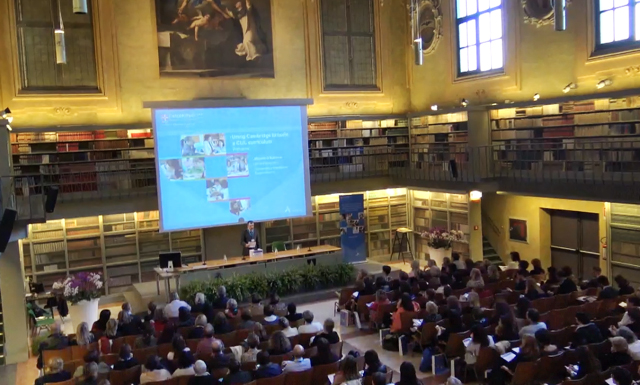As Marketing Communications Manager for Europe, I had the pleasure of welcoming over 200 people to Bologna earlier this month for a day-long event dedicated to CLIL (Content Integrated Language Learning) and bilingual education. Delegates included principals, teachers and education specialists. It was really exciting to be a part of this event – the first of its kind that we’ve held in Italy.
The Italian government has recently made it compulsory for schools to teach at least one subject in a second or foreign language in the final year of high school. A number of Italian state schools have been using Cambridge IGCSEs alongside elements of the national curriculum to great success, and the new legislation means that other schools want to follow this model.
The first state school to adopt Cambridge, back in 1997, was the Liceo Galvani in Bologna.
It was the support of Liceo Galvani which brought us to Bologna. We had use of their classrooms and their teachers contributed to the programme. To my immense gratitude, they also offered to release a number of their students to help run the event on the day.
These students stayed behind after morning classes on the Saturday and, ‘fresh’ off my flight, I went to explain what I needed them to do. They seemed genuinely excited by what lay in store.
The day of the conference came, and with it, the challenge to welcome and look after 200+ guests arriving from across the country in a short space of time. The students were bright and early, dressed smartly and ready for instruction. I doubt any of them had done anything like this before but they simply figured it out as they went along. They worked together and shared ideas and information, enabling all of them to answer questions from our guests.
All of the helpers were Cambridge IGCSE students and I enjoyed talking to them about their experiences as bilingual learners. I was told that while learning in English was challenging at the beginning, it got easier as more of the vocabulary and its usage fell into place through context. ‘Context’ is essentially what’s at the heart of CLIL, and it’s this that allowed my student helpers to problem-solve so effectively in their second language.
You can plan an event to the smallest detail and it will still throw you a curve ball.
Once the opening speeches had begun, we received news that one of the leaders from the afternoon session had been detained in an airport 6000 km away. We had to think fast, combine sessions, inform all of the delegates and change the rooms to accommodate larger numbers. One of the students asked me if she should go back to the school to change all of the signs on the room doors. I was hugely impressed that not only had she identified a potential problem, she was using her initiative to find a solution.
The positive impact of CLIL.
During the conference there was a lot of lively discussion around the latest pedagogical thinking behind CLIL in addition to recommended classroom strategies and development plans for teachers.
What I personally took away from the event was the impact of this teaching approach on the young people that I’d met. They were comfortable working in English, collaborated well, and problem-solved quickly.
For all the challenges that new teaching strategies can bring, the rewards can be numerous.
In the run up to the conference, I had the pleasure of meeting two former Cambridge IGCSE students from Italy, now settled at university in the UK. We made short films about their experiences (featured above) transitioning up to higher education and each gave warm video messages to their former teachers.
Both were highly enthusiastic about their subjects and confident about their future place in the world. They had every reason to be and I was delighted to see the same confidence in their younger peers in Bologna.
The conference was a huge success but the main thing I’ve taken away from it is seeing Cambridge in action. To see students applying all the great skills that our programmes develop and that these skills set them up so well for the future is a real pleasure.





